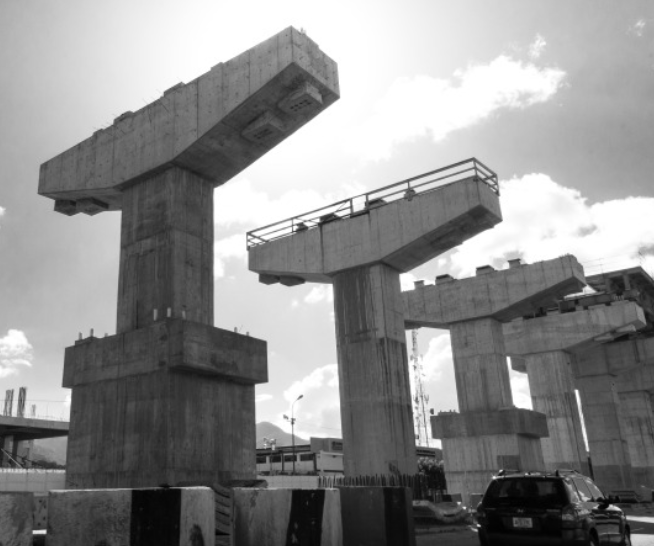Caracas-Guatire Metro-rail project left unfinished by Odebrecht. ©Rodrigo Romero 2017.
After a muted response that set Venezuela apart from other Latin American nations rocked by the Odebrecht scandal, President Nicolas Maduro has announced that his government will support a full investigation into the company’s activities in Venezuela. However, the manner in which it has been carried out is raising questions about the government’s intentions.
Ever since the Brazilian construction giant reached the largest anticorruption settlement in history with the United States, Brazil, and Switzerland in late 2016, Odebrecht’s admission of paying hundreds of millions of dollars in bribes related to over 100 projects in countries throughout the developing world has sparked outrage in the hemisphere. Officials in Argentina, Mexico, Ecuador, Colombia and elsewhere were quick to launch high-profile investigations into the case, and Peru even issued an arrest warrant for former President Alejandro Toledo for his ties to the scandal.
In Venezuela though, Maduro initially reacted to the corruption scheme with relative silence. In January, the Attorney General’s office claimed it was cooperating with authorities in Brazil and Switzerland, and that it was seeking the arrest of an unnamed individual who allegedly accepted bribes, though no further details were revealed. This low-key approach continued despite calls from the opposition-controlled National Assembly and civil society for a full investigation and more information about official collusion in the scheme.
The silence was finally broken on February 12, when Maduro called on the country’s law enforcement and judicial institutions to take a “mano dura” approach to those implicated. On February 14, the public prosecutor’s office (Fiscalia) ordered the arrest of Euzenando Prazeres de Azevedo, the president of Odebrecht in Venezuela. Authorities also raided the company’s offices that afternoon.
There is more to this story, however. Maduro’s announcement came just 24 hours after a pair of Brazilian journalists who were working with Transparency Venezuela activists to investigate an incomplete Odebrecht project were detained by the National Guard in Maracaibo for taking photos. Their detention caused immediate international reaction.
Other aspects of the government’s approach to the scandal so far are also raising questions. While the Attorney General’s office “coordinated” the search it was actually carried out by the Military Counterintelligence Division. This has led some, like Juan Guaidó—chair of the National Assembly’s Comptroller’s Commission–to question whether the raid itself was an excuse to take control over potentially embarrassing information involving high level Chavista officials.
Seen through this lens, the arrest warrant for Prazeres de Azevedo looks different. The Odebrecht executive is reportedly wanted for justice in Brazil. Was issuing the warrant in Venezuela part of an earnest investigation, or was it an excuse to open up domestic legal proceedings and create a barrier to extradition in order to prevent any embarrassing information from coming out in Brazil?
This remains an open question, but there is certainly reason to think that the Venezuelan government would have a vested interest in containing the scandal. While few details have emerged about specific illicit transactions between officials and the company, it is clear that Odebrecht was a leading recipient of major public works contracts in Venezuela, in many cases with little to show for it. Documents released as part of the settlement show Odebrecht paid 98 million dollars to obtain public work contracts in Venezuela, knowing that these funds would be used for bribery.
Apparently in return, Odebricht received billions of dollars—$11 billion under the Chavez administration—to build ambitious projects. However, as the Wall Street Journal has noted, few of these projects were actually completed and have since been abandoned.
Odebrecht’s ties to the Venezuelan government appear to go deeper than payments for lucrative public works projects. The company has also been linked to the late Hugo Chavez’s reelection campaign in 2012. The wife of Chavez campaign strategist João Santana, has claimed that Odebrecht donated $35 million to the campaign through shell corporations in the Caribbean. Additionally, Brazilian Federal Police police reportedly found references to Diosdado Cabello in notes that jailed Odebrecht CEO Marcelo Odebrecht kept on his cell phone.
There may be a chance that Venezuela is simply investigating a major scandal that has rocked the entire region. But considering its two-month silence on the case, and the lack of attention paid to other major allegations of corruption, the government’s sudden interest in Odebrecht seems suspicious.
The Odebrecht scandal could also pose challenges for the Venezuelan opposition. In Brazil, Odebrecht famously greased the palms of politicians of all political stripes, and in Venezuela there are reports that this may have occurred as well.
Citing a company executive, the WSJ reports that Odebrecht “made donations through third parties to the opposition-controlled government of Miranda state, where some of its biggest Venezuelan projects are located.” These allegations could spell trouble for opposition figure Henrique Capriles, who has been denounced in the Attorney General’s Office for supposedly receiving bribes.
Even if the specifics of Odebrecht’s bribery operations in Venezuela are unclear, ongoing investigations elsewhere in Latin America are beginning to bring pieces of the scheme to light. In Peru, for instance, documents provided to authorities show that Odebrecht discretely transferred $377,000 into an account under the name of Lucas Valera, an engineer who worked on the construction of the Orinoquia bridge in Bolivar state. As Armando.info reports though, Valera claims he received the funds as part of a “book deal.”



